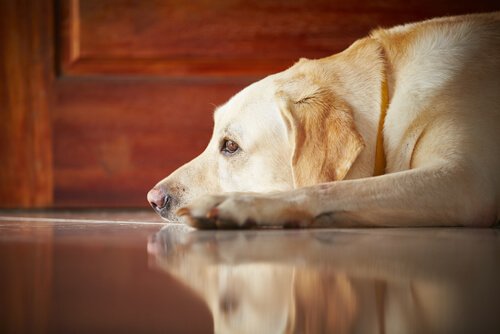Canine Coronavirus: Symptoms and Treatment


Written and verified by the lawyer Francisco María García
Canine coronavirus affects dogs of every breed and age. Puppies are more vulnerable to the virus because their immune systems are still developing. Dogs with weak immune systems are also at risk of catching it. While it’s not an extremely serious disease, it does need to be treated immediately.
This disease is an acute condition that won’t become chronic. In other words, it’s a viral illness and must run its course.
The coronavirus causes an infection that takes between 24 and 48 hours to show any symptoms. It only becomes visible after the incubation period. It’s important to go to the vet as soon as possible for treatment.
What are the symptoms of canine coronavirus?
The animal may have one or more of these symptoms when infected:
- Abdominal pain
- Change in fecal matter odor
- Diarrhea or blood in feces
- A fever higher than 104 °F
- Lethargy
- Vomiting
- Dehydration
- Lack of appetite
The sickness may be milder with an early diagnosis. For that reason, you must watch carefully for any changes in your pet.

Is it possible to treat canine coronavirus?
There is no drug-based cure. The only thing you can do is to treat the symptoms of the disease and alleviate the animal’s discomfort. In addition, you can prevent other illnesses that may come as a result of canine coronavirus. The virus is eliminated through the feces.
Veterinarian-prescribed treatment
Depending on the case, a veterinarian may prescribe medication or advise any of the following steps:
- It’s important to make sure the dog is hydrated in order to prevent other problems.
- Although treatment may not eliminate the virus, it can reduce the way it attacks the body
- Products to stimulate the appetite. The dog needs to eat enough food to have energy and get its strength back.
- Antibiotics. A veterinarian may prescribe them to treat other infections that can stem from damage caused by the virus.
- Prokinetics: In cases of vomiting or diarrhea, the dog may need drugs to strengthen its gastrointestinal system.
Supplementary treatment in the diet
A diet rich in nucleotides, immunoglobulins, and prebiotics is very beneficial. This is especially true for puppies, as these nutrients can accelerate the development of their immune systems.
Nucleotide supplements generate increased antibody production, which is necessary for counteracting viruses in a dog’s body. Lymphocytes also increase their power when infections are present.
Immunoglobulins come from bovine colostrum and egg yolks. They combat canine coronavirus by preventing bacteria from binding to the intestinal mucus. Therefore, they strengthen the mucus membrane so that it can form a barrier against harmful bacteria.

Prebiotics stimulate the beneficial bacteria that strengthen the immune system. Although the body already produces them, special supplements are available.
Prevention is key
When you make the decision to get a new dog, you’ll have new responsibilities. Taking care of your new friend is the first step. Dogs depend on their owners, and, in addition to affection, they need other kinds of care.
Obviously, no one likes to see their pet get sick. Therefore, adopting certain habits as soon as you get a pet will prevent certain negative situations:
- A balanced diet. Balanced foods have the nutrients that every animal needs. It’s also good to know how to choose the right food for each stage of a dog’s life. He depends on that for healthy development.
- Vaccines. It’s important to follow a vaccination schedule. This way, the immune system will be strengthened against viruses and bacteria.
- Regular checkups. Besides making sure the pet is in perfect health, you’ll need to take him for regular checkups. There may be some asymptomatic problems that only a professional can detect.
- Good hygiene. In addition to bathrooms, keep all utensils clean. You should wash food and water containers every day. It’s also important to disinfect all the areas where your pet goes.
- Physical exercise. Maintaining an exercise regime suitable for its breed keeps a dog in better shape. In addition, walking together helps you bond with your pet, which is very important for his growth.
Conclusion
If your dog comes down with canine coronavirus despite all the care you’ve given him, you’ll have to seek treatment. Consult your vet and follow all his instructions to the letter. In addition to that, show your pet patience and love until the sickness passes.
Canine coronavirus affects dogs of every breed and age. Puppies are more vulnerable to the virus because their immune systems are still developing. Dogs with weak immune systems are also at risk of catching it. While it’s not an extremely serious disease, it does need to be treated immediately.
This disease is an acute condition that won’t become chronic. In other words, it’s a viral illness and must run its course.
The coronavirus causes an infection that takes between 24 and 48 hours to show any symptoms. It only becomes visible after the incubation period. It’s important to go to the vet as soon as possible for treatment.
What are the symptoms of canine coronavirus?
The animal may have one or more of these symptoms when infected:
- Abdominal pain
- Change in fecal matter odor
- Diarrhea or blood in feces
- A fever higher than 104 °F
- Lethargy
- Vomiting
- Dehydration
- Lack of appetite
The sickness may be milder with an early diagnosis. For that reason, you must watch carefully for any changes in your pet.

Is it possible to treat canine coronavirus?
There is no drug-based cure. The only thing you can do is to treat the symptoms of the disease and alleviate the animal’s discomfort. In addition, you can prevent other illnesses that may come as a result of canine coronavirus. The virus is eliminated through the feces.
Veterinarian-prescribed treatment
Depending on the case, a veterinarian may prescribe medication or advise any of the following steps:
- It’s important to make sure the dog is hydrated in order to prevent other problems.
- Although treatment may not eliminate the virus, it can reduce the way it attacks the body
- Products to stimulate the appetite. The dog needs to eat enough food to have energy and get its strength back.
- Antibiotics. A veterinarian may prescribe them to treat other infections that can stem from damage caused by the virus.
- Prokinetics: In cases of vomiting or diarrhea, the dog may need drugs to strengthen its gastrointestinal system.
Supplementary treatment in the diet
A diet rich in nucleotides, immunoglobulins, and prebiotics is very beneficial. This is especially true for puppies, as these nutrients can accelerate the development of their immune systems.
Nucleotide supplements generate increased antibody production, which is necessary for counteracting viruses in a dog’s body. Lymphocytes also increase their power when infections are present.
Immunoglobulins come from bovine colostrum and egg yolks. They combat canine coronavirus by preventing bacteria from binding to the intestinal mucus. Therefore, they strengthen the mucus membrane so that it can form a barrier against harmful bacteria.

Prebiotics stimulate the beneficial bacteria that strengthen the immune system. Although the body already produces them, special supplements are available.
Prevention is key
When you make the decision to get a new dog, you’ll have new responsibilities. Taking care of your new friend is the first step. Dogs depend on their owners, and, in addition to affection, they need other kinds of care.
Obviously, no one likes to see their pet get sick. Therefore, adopting certain habits as soon as you get a pet will prevent certain negative situations:
- A balanced diet. Balanced foods have the nutrients that every animal needs. It’s also good to know how to choose the right food for each stage of a dog’s life. He depends on that for healthy development.
- Vaccines. It’s important to follow a vaccination schedule. This way, the immune system will be strengthened against viruses and bacteria.
- Regular checkups. Besides making sure the pet is in perfect health, you’ll need to take him for regular checkups. There may be some asymptomatic problems that only a professional can detect.
- Good hygiene. In addition to bathrooms, keep all utensils clean. You should wash food and water containers every day. It’s also important to disinfect all the areas where your pet goes.
- Physical exercise. Maintaining an exercise regime suitable for its breed keeps a dog in better shape. In addition, walking together helps you bond with your pet, which is very important for his growth.
Conclusion
If your dog comes down with canine coronavirus despite all the care you’ve given him, you’ll have to seek treatment. Consult your vet and follow all his instructions to the letter. In addition to that, show your pet patience and love until the sickness passes.
This text is provided for informational purposes only and does not replace consultation with a professional. If in doubt, consult your specialist.








